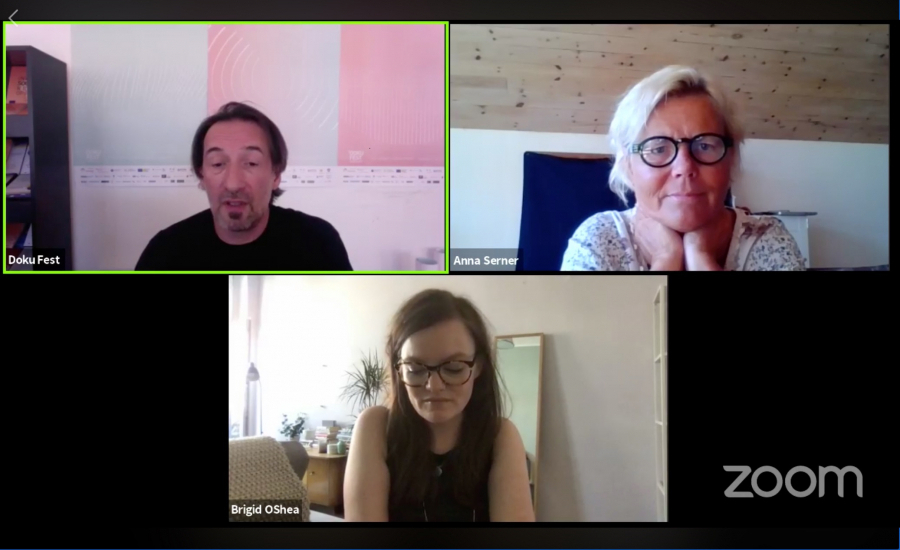14/08/2020
The first round of DokuTalks, a series of talks and discussions bringing together industry professionals on behalf of DokuFest, successfully kicked off on Tuesday, August 11. This event brought together Anna Serner, as the CEO of Swedish Film Institute and well- known advocate for gender equality, and Brigid O’shea as the head of DOK Industry at DOK Leipzig as well as founding member of the Documentary Association of Europe. Acknowledging challenges and uncertainties of the audiovisual sector that continue to prevail due to the global pandemic, Serner and O’Shea’s conversation tackled a series of steps to adopt to embrace a world beyond 2020, also referred to as “the new normal”.
As a way to look forward, Brigid suggests that the conversation should open up with going backward in time and retracing the experiences that have led up to this point. Therefore, she begins discussing core values, such as diversity and inclusion. For Anna, the core of her engagement is the aim of doing good work, and this is why during her experience in the film industry, she has always insisted in gathering different perspectives of life, specifically focused on those that had difficulty getting through to the audience, and the ones which suffered from quality. “However”, Anna states, “one equality opens up for others, and it is a never-ending quest for Sweden to achieve the best in the world of film”.
Brigid, curious about Anna’s past experiences in working on the media and association field due to the grassroots nature of work, wonders about her transition to the audiovisual sector. Anna defines the transition as difficult, while drawing differences between organizations working primarily for their interest, and public-funding institute which works closer to the industry. According to her experience, a way to get adapted in the film work field is to be persistent in moving forward, altogether while staying close to the industry. On the other hand, to Brigid, the idea of the film industry working in isolation is incorrect, because the first work that needs to be done is to establish and nurture the trust and the relationships that have been broken, starting from the audience trusting cinema halls as a meeting point. Moreover, Brigid says that she “refuses to go back to what the industry was in February” while wondering what approaches have radically changed regarding diversity and inclusion since the beginning of the pandemic.
To Anna, the ways of interrelating to each other have indeed been disrupted, however, she appreciates the last three months of the pandemic as a reflection tool concerning the core of the society and the business of being human. Consuming culture and talking about it, she says, has
made everyone understand that getting down to the basics is what we need to move forward. Taking as an example the Black Lives Matter movement that has gained international attention during the pandemic, Anna says that “the core is to trust that culture can support our human society, only if it is
taken care of by everyone”.
This reflection serves Brigid to question the relationship that exists between the institutions and the industry. “The key”, Anna says, “is to invite the people who have not had the chance to be part of the structures”. She agrees that there is an urgent need to rethink structures and change protocols (including picking and evaluating films), to create a fresh narrative. Brigid brings the attention to the fact that the first work that needs to be done, amongst many, is to break internal misogyny as a way to explicit invisible barriers (either financial, psychological, or cultural) that are holding people back from taking initiatives. She and Anna agree that the main focus should be communication, in all the levels. From this point, Anna suggests that an action plan needs to be built: breaking unconsciousness, raising awareness to others, as well as role-modeling are effective steps to challenge what seems impossible.
Asked if her approach to the work has changed with the pandemic, Anna says that there has always been the need to disrupt the structure. The financial difficulties, however, have brought to light a series of dilemmas regarding funding. In the end, she says, priority will be given to the stories within the culture, while gradually letting go of bureaucracies of selecting. The decision should also be made by the people consuming the stories. This indicates a reconsideration of what the audience wants to see in the cinema, while honesty, openness, and curiosity between the Swedish Film Institute and the industry has helped shaped priorities. To Brigid, there is time left only for truth, making this period of a great opportunity to change because there is no other choice.
“BEYOND 2020 INTO A NEW NORMAL” is up for viewing on DokuFest’s online platform.
By Enxhi Noni

